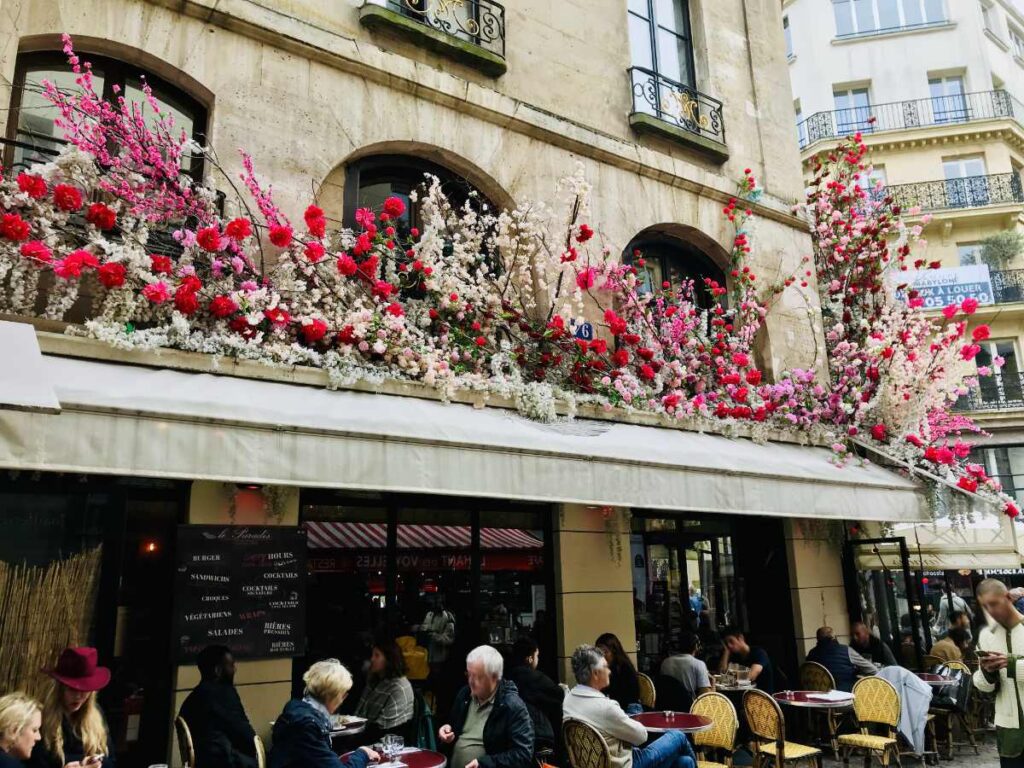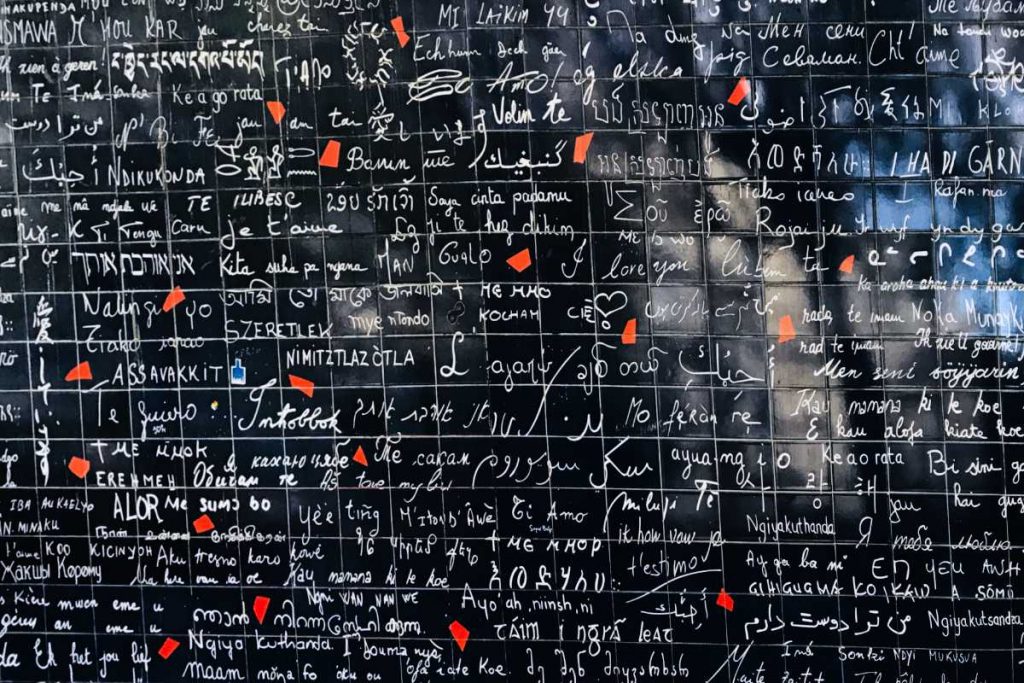With French being the language of love, you know that there are going to be some beautifully romantic French poems about love.
Poetry is considered quite an important art form in French culture, with even small children learning poetry in school. A soft play on words transporting you to a different time or place, poetry has always had ability to capture one’s heart.
Now, I’ve tried to pick a variety of French poems that are short and long, because sometimes less in more. A lot of classic French poetry tends to be quite long and sad, which can be unhelpful if you are looking for a couple of verses for a Valentine’s Day gift or a special occasion to share with a date or your loved one.
Sometimes you need to be more creative than just a Je t’aime (I love you) in French, so that might call for a poem.
I’ve tried to select poetic passages and verses that are shorter, without losing any of their meaning, along with the book or collection they came from, so you can look up the full book if necessary.
And so with that, here are the top French love poems that have stood the test of time. Allons-y!

1. L’amour est le miel – Victor Hugo
French writer Victor Hugo, who wrote such famous novels as Les Miserables and children’s books like the Hunchback of Notre Dame, also wrote a play called Le roi s’amuse (meaning “the King amuses”).
In it, he has a beautiful romantic verse that goes as follows:
| French Love Poem | English Translation |
|---|---|
| La vie est une fleur, l’amour en est le miel. C’est la colombe unie à l’aigle dans le ciel, | Life is a flower love is its honey. It is the dove united with the eagle in the sky, |
| C’est la grâce tremblante à la force appuyée, C’est ta main dans ma main doucement oubliée. | It is trembling grace with sustained force, It’s your hand in my hand gently forgotten. |
The line “La vie est une fleur, l’amour en est le miel.” remains one of the most famous French quotations about love, to this day.
2. Air vif – Paul Éluard
French poet Paul Éluard (full name Eugène Émile Paul Grindel) and Resistant during WWII, published this poem as part of Le Phénix in 1951.
It was as a tribute to his partner, Dominique, whom he had recently lost.
| French Love Poem | English Translation |
|---|---|
| J’ai regardé devant moi Dans la foule je t’ai vue Parmi les blés je t’ai vue Sous un arbre je t’ai vue | I looked in front of me In the crowd I saw you Among the wheat field I saw you Under a tree I saw you |
| Au bout de tous mes voyages Au fond de tous mes tourments Au tournant de tous les rires Sortant de l’eau et du feu | At the end of all my travels At the bottom of all my torments At the turn of all the laughter Coming out of the water and fire |
| L’été l’hiver je t’ai vue Dans ma maison je t’ai vue Entre mes bras je t’ai vue Dans mes rêves je t’ai vue | Summer winter I saw you In my house I saw you In my arms I saw you In my dreams I saw you |
| Je ne te quitterai plus | I will not leave you any more |
3. Les amoureux – Madeleine de Scudéry
The 18th century writer Madeleine de Scudéry wrote this lovely French poem dedicated to all les amoureux (“the lovers”) out there:
| French Poem | English Translation |
|---|---|
| L’eau qui caresse le rivage, La rose qui s’ouvre au zéphir, Le vent qui rit sous le feuillage, Tout dit qu’aimer est un plaisir. | The water that caresses the shore, The rose that opens with a breeze, The wind that laughs under the leaves, Everyone says that to love is a pleasure. |
| De deux amants l’égale flamme Sait doublement les rendre heureux. Les indifférents n’ont qu’une âme; Mais lorsqu’on aime, on en a deux. | Of two lovers equal flame Doubly knows how to make them happy. The indifferent have only one soul; But when you love, you have two. |
4. Pour toi ma chérie – Armand Gouffé
Armand Gouffé, a 19th century French poet, wrote Pour toi ma chérie meaning “For you my dear” in Ballon d’essai (1802).
| French Poem | English Translation |
|---|---|
| Pour toi, femme chérie, Je crois Que j’offrirais ma vie Cent fois; Mais, satisfait de suivre Ta loi, J’aime cent fois mieux vivre Pour toi. | For you, wife darling, I believe That I would offer my life A hundred times; But, satisfied to follow Your law, I like a 100 times better to live For you. |
| Je n’aime rien au monde Sans toi; Tout me plaît à la ronde Par toi: Ma richesse et ma gloire, C’est toi; J’ai chanté… je vais boire Pour toi. | I don’t like anything in the world Without you; I like everything around By you: My wealth and my glory, It’s you; I sang… I’m going to drink For you. |

5. Certitude – Paul Éluard
Anther extract written Paul Éluard in Le Phénix in 1951, is the verse Certitude meaning “certainity” in French.
| French Love Poem | English Translation |
|---|---|
| Si je te parle c’est pour mieux t’entendre Si je t’entends je suis sûr de te comprendre Si tu souris c’est pour mieux m’envahir Si tu souris je vois le monde entier | If I speak to you, it is to hear you better If I hear you I’m sure I understand you If you smile, it’s the better to invade me If you smile I see the whole world |
| Si je t’étreins c’est pour me continuer Si nous vivons tout sera à plaisir Si je te quitte nous nous souviendrons En te quittant nous nous retrouverons. | If I hug you it’s to keep me going If we live it will be all fun If I leave you we will remember And in leaving you we will meet again. |
6. Un baiser – Edmond Rostand
French poet Edmond Rostand write the following verse Un Baiser (meaning “a kiss”) in his most famous work, Cyrano de Bergerac published in 1897.
| French Love Poem | English Translation |
|---|---|
| Un baiser, mais à tout prendre, qu’est-ce que c’est ? Un serment fait d’un peu plus près, une promesse plus précise, | A kiss, but all in all, What is that ? An oath that is closer, a promise more precise, |
| Un aveu qui veut se confirmer, un point rose qu’on met sur l’i du verbe aimer ; c’est un secret qui prend la bouche pour oreille. | A confession that wants to be confirmed, a pink dot that we put on the i of the verb to love; it’s a secret that takes word of mouth. |

7. Aimer – Roméo et Juliette (Music band)
It is only appropriate that a pair of musicians with a stage name “Romeo and Juliette” put out a hit love song called “Aimer”, meaning “to love” in French. You can find more French love songs here.
| French Love Poem | English Translation |
|---|---|
| Aimer C’est ce qu’il y a de plus beau Aimer C’est monter si haut Et toucher les ailes des oiseaux Aimer C’est ce qu’il y a de plus beau | To Love This is what is most beautiful To love It is going up so high to touch the wings of the birds To Love This is what is most beautiful |
8. Une Simple lettre d’Amour – Yann Moix
A book called Une Simple lettre d’Amour, meaning “A simple love letter” by French author Yann Moix in 2015, contains this beautiful French verse:
| French Love Poem | English Translation |
|---|---|
| Ce serait toi, c’était toi, l’élue. Je ne voulais pas me marier parce que le mariage c’est pour toute la vie. | It would be you, it was you, the chosen one. I didn’t want to get married because marriage is for life. |
| Et que toute la vie pour t’aimer me semblait un peu court. L’éternité serait un bon compromis. | And that all my life to love you seemed a bit short to me. Eternity would be a good compromise. |
9. J’ai rêvé de toi – Henri-Frédéric Amiel
J’ai rêvé de toi, meaning “I had a dream about you”, is a verse from La part du rêve by Swiss poet Henri-Frédéric Amiel that was published in 1863.
| French Love Poem | English Translation |
|---|---|
| Depuis que je t’ai vue, ébloui par l’éclair, Mon œil s’est voilé d’un mirage; Je regarde sans voir, ou je ne vois dans l’air Flotter qu’une forme, ta douce image; | Since I saw you, dazzled by the lightning, My eye is veiled with a mirage; I look without seeing, or I do not see in the air Float only a shape, your sweet image; |
| Le jour, tout éveillé, je songe ; et, dans la nuit, Comme un feu follet qui se lève, Cette image, la tienne, apparaît, et me suit Au plus profond de mon âme et de mon rêve. | During the day, all awake, I dream; and, in the night, Like a wisp that rises, This image, yours, appears, and follows me Deep in my soul and in my dream. |

10. La sincère – Marceline Desbordes Valmore
La sincère meaning “the sincerity” by French poet Marceline Desbordes Valmore was published in 1833. It was part of a collection called Les pleurs meaning “the tears”.
| French Love Poem | English Translation |
|---|---|
| Veux-tu l’acheter ? Mon cœur est à vendre. Veux-tu l’acheter ? Sans nous disputer. | Do you want to buy it? My heart is for sale. Do you want to buy it? Without arguing. |
| Dieu l’a fait d’aimant, Tu le feras tendre. Dieu l’a fait d’aimant, Pour un seul amant! | God made him loving, You will make him tender. God made him loving, For one lover! |
11. Je dédie à tes pleurs, à ton sourire – Emile Verhaeren
Another beautiful poem is Je dédie à tes pleurs, à ton sourire, meaning “I dedicate to your tears and your smile”. It was written by Belgian poet Emile Verhaeren in the book Les Heures claires (“the clear hours”) in 1896.
| French Love Poem | English Translation |
|---|---|
| Je dédie à tes pleurs, à ton sourire, Mes plus douces pensées, Celles que je te dis, celles aussi Qui demeurent imprécisées Et trop profondes pour les dire. | I dedicate to your tears, to your smile, My sweetest thoughts, The ones I tell you, the ones too Which remain imprecise And too deep to say them. |
12. L’amour est enfant de Bohême – Ludovic Halévy et Henri Meilhac
Georges Bizet famously composed the opera Carmen (1875) written by Ludovic Halévy et Henri Meilhac, which contained this light-hearted French verse:
| French Love Poem | English Translation |
|---|---|
| L’amour est enfant de Bohême, Il n’a jamais, jamais connu de loi; Si tu ne m’aimes pas, je t’aime; Si je t’aime, prends garde à toi! | Love is a child of Bohemia, He never, ever knew a law; If you don’t love me, I love you; If I love you, take care of yourself! |
13. L’attente – Molière
L’attente meaning “the wait” is from legendary French writer Molière in his play Amphitryon, which was first presented in 1668.
| French Love Poem | English Translation |
|---|---|
| L’attente d’un retour ardemment désiré Donne à tous les instants une longueur extrême, | The wait for a longed-for return Gives us all the moments of extreme length, |
| Et l’absence de ce qu’on aime, Quelque peu qu’elle dure, a toujours trop duré. | And the absence of what we like, However long it lasts, has always lasted too long. |
14. Rappelle-toi – Alfred de Musset
French dramatist Alfred de Musset had a legendary love affair with another famous writer George Sand (born Amantine Lucile Aurore Dupin), during which they wrote several passionate love letters and poems to each other.
Rappelle-toi, meaning “remind yourself” is from his collection called Poésies nouvelles (“New Poems”) published in 1850.
| French Love Poem | English Translation |
|---|---|
| Rappelle-toi, lorsque les destinées M’auront de toi pour jamais séparé, Quand le chagrin, l’exil et les années Auront flétri ce coeur désespéré; | Remind yourself, when the destinies Will have me separated from you forever, When sorrow, exile and years Will have withered this desperate heart; |
| Songe à mon triste amour, songe à l’adieu suprême ! L’absence ni le temps ne sont rien quand on aime. | Think of my sad love, think of the supreme farewell! Absence and time are nothing when you love. |
| Tant que mon coeur battra, Toujours il te dira Rappelle-toi. | As long as my heart beats He will always tell you Remind yourself. |

15. Il n’y a pas d’amour heureux – Louis Aragon
Il n’y a pas d’amour heureux, meaning “there is not a happy love” was written by French poet Louis Aragon in a collection of poems called La Diane française written during WWII and published at the end of the war in 1944.
| French Love Poem | English Translation |
|---|---|
| Il n’y a pas d’amour qui ne soit à douleur Il n’y a pas d’amour dont on ne soit meurtri Il n’y a pas d’amour dont on ne soit flétri Et pas plus que de toi l’amour de la patrie | There is no love that is not painful There is no love that we don’t hurt There is no love that we are not withered And no more than you, the love the motherland |
| Il n’y a pas d’amour qui ne vive de pleurs Il n’y a pas d’amour heureux Mais c’est notre amour à tous les deux | There is no love that does not live in tears There is no happy love But it’s our love, two together |
16. À Ninon – Alfred de Musset
Another beautiful verse from Alfred de Musset’s Poésies nouvelles (1850) is dedicated to Ninon. Ninon is a diminutive of the name Anne, but it is not really clear who Anne is. Nonetheless à Ninon is certainly a lovely poem:
| French Love Poem | English Translation |
|---|---|
| J’aime, et je sais répondre avec indifférence J’aime, et rien ne le dit j’aime, et seul je le sais Et mon secret m’est cher, | I love, and I know how to respond with indifference I love it, and nothing says so I love it, and only I know it And my secret is dear to me, |
| Et chère ma souffrance Et j’ai fait le serment d’aimer sans espérance Mais non pas sans bonheur – je vous vois, c’est assez. | And dear my suffering And I took the oath to love without hope But not without happiness – I see you, that’s enough. |
17. Hier au soir – Victor Hugo
From Les Contemplations (“the thoughts”) published in 1911, Victor Hugo’s Hier au soir (“yesterday evening”) is hauntingly sweet poem.
| French Love Poem | English Translation |
|---|---|
| Hier au soir Hier, le vent du soir, dont le souffle caresse, Nous apportait l’odeur des fleurs qui s’ouvrent tard; | Yesterday evening Yesterday, the evening wind, whose breath caresses, Brought us the smell flowers that open late; |
| La nuit tombait; l’oiseau dormait dans l’ombre épaisse. Le printemps embaumait, moins que votre jeunesse; Les astres rayonnaient, moins que votre regard. | Night was falling; the bird was sleeping in the thick shade. Spring was fragrant, less than your youth; The stars were shining, less than your gaze. |
| Moi, je parlais tout bas. C’est l’heure solennelle Où l’âme aime à chanter son hymne le plus doux. | I was talking in a low voice. It’s the solemn hour Where the soul loves to sing his sweetest hymn. |
| Voyant la nuit si pure et vous voyant si belle, J’ai dit aux astres d’or: Versez le ciel sur elle! | Seeing the night so pure and seeing you so beautiful, I said to the golden stars: Pour the sky on her! |
| Et j’ai dit à vos yeux: Versez l’amour sur nous! | And I said to you: Pour love on us! |
18. Le Pont Mirabeau- Guillaume Apollinaire
Those who love the city of Paris, will love the poem Le Pont Mirabeau (the bridge Mirabeau) by Guillaume Apollinaire. The singer Marc Lavoine would turn the famous poem into a classic song about Paris.
Dedicated to all the lovebirds strolling around the quays of the Seine river, it will transport you back to City of Lights. You can find more lovely quotes about Paris here.
| French Love Poem | English Translation |
|---|---|
| Sous le pont Mirabeau coule la Seine Et nos amours Faut-il qu’il m’en souvienne La joie venait toujours après la peine Vienne la nuit sonne l’heure Les jours s’en vont je demeure | The Seine flows under the Mirabeau bridge And our loves He has to remind me of that Joy always came after pain Vienna at night strikes the hour The days go by I remain |
| Les mains dans les mains restons face à face Tandis que sous Le pont de nos bras passe Des éternels regards l’onde si lasse Vienne la nuit sonne l’heure Les jours s’en vont je demeure | Hand in hand let’s stay face to face While under The bridge of our arms passes Eternal gazes the wave so weary Vienna at night strikes the hour The days go by I remain |
| L’amour s’en va comme cette eau courante L’amour s’en va Comme la vie est lente Et comme l’Espérance est violente Vienne la nuit sonne l’heure Les jours s’en vont je demeure | Love goes like this running water Love flies away How slow life is And as Hope is violent Vienna at night strikes the hour The days go by I remain |
| Passent les jours et passent les semaines Ni temps passé Ni les amours reviennent Sous le pont Mirabeau coule la Seine Vienne la nuit sonne l’heure Les jours s’en vont je demeure. | Pass the days and pass the weeks Neither time passed Nor lovers returned The Seine flows under the Mirabeau bridge Vienna at night strikes the hour The days go by I remain. |
19. Jour de Saint Valentin – Charles, Duke of Orleans
Medieval poet, Charles of Orléans has sometimes been called the father of French poetry. Born in Paris, he was in line to the French throne as the nephew of King Charles VI of France.
At the battle of Agincourt in 1415 during the Hundred Years’ War, the 21-year-old Charles of Orléans was taken prisoner by the English. He would spend the next 25 years as a prisoner of war before his return to France.
It was during this period and after that Charles wrote some of the most beautiful poetry in the French language. Many of his poems were to his wife Bonne, who sadly died before he was released from captivity.
He is accredited to written the earliest known Valentine’s day card, as he wrote several poems about the day.
| French love poem | English translation |
|---|---|
| Le beau soleil, le jour saint Valentin, Qui apportait sa chandelle allumée, N’a pas longtemps, entra un bien matin | The beautiful sun, on Valentine’s Day, Who brought her lighted candle, Didn’t have long, entered one good morning |
| Privéement en ma chambre fermée. Celle clarté, qu’il avait apportée, Si m’éveilla du somme de Souci, Où j’avaië toute la nuit dormi Sur le dur lit d’ennuyeuse pensée. | Privately in my closed room. That clarity, which he had brought, If woke me from the sleep of Worry, where I had slept all night On the hard bed of boring thought. |
| Ce jour aussi, pour partir leur butin Des biens d’Amours, faisaient assemblée Tous les oiseaux, qui parlants leur latin, Criaiënt fort, demandants la livrée | This day too, to leave their booty Goods of Love, gathered together All the birds, speaking their Latin, Shouted loudly, asking for the livery |
| Que Nature leur avait ordonnée; C’était d’un pair comme chacun choisi; Së ne me pu rendormir, pour leur cri, Sur le dur lit d’ennuyeuse pensée. | That Nature had ordained them; It was of a peer as each chosen; Could not put me back to sleep, for their cry, On the hard bed of boring thought. |
| Lors en mouillant de larmes mon coussin, Je regrettai ma dure destinée, Disant: Oiseaux je vous voi en chemin De tout plaisir et joië désirée; | Then, wetting my cushion with tears, I regretted my hard destiny, Saying: Birds I see you on the way Of all desired pleasure and joy; |
| Chacun de vous a pair qui lui agrée, Et point n’en ai, car Mort, qui m’a trahi, A pris mon pair, dont en deuil je langui Sur le dur lit d’ennuyeuse pensée. | Each of you has a partner who pleases him, And I have none, for Death, who betrayed me, Took my partner, whose mourning I languish On the hard bed of boring thought. |
| L’ENVOI Saint Valentin choisissent cette année Ceux et celles de l’amoureux parti; Seul me tendrai, de confort dégarni, Sur le dur lit d’ennuyeuse pensée. | THE SEND Saint Valentines’ day chose this year Those of the departed lover; Alone I will stretch out, with bare comfort, On the hard bed of boring thought. |

If you enjoyed that article, you may enjoy reading more about love and romance in France. A bientôt!




